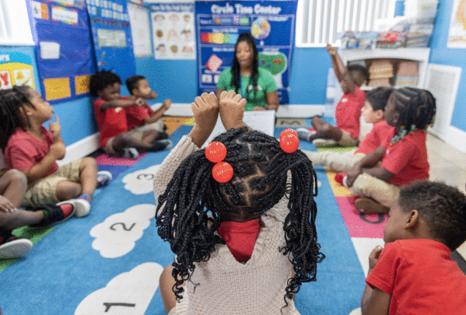Florida looks to improve pre-K quality with new preschool ratings
Published in News & Features
ORLANDO, Fla. — For decades, Florida faced criticism for judging the quality of its pre-K program on a “readiness” test given to young students after they started kindergarten. It was a system, critics argued, that penalized preschools serving the kids who struggle the most — often those from low-income families.
Now, the state is debuting a new rating system that gives more credit for the progress these fledgling students make over the course of their time in preschool. Advocates and educators say the changes should boost preschools that serve challenging populations, leading to better pre-K education across the board.
“I’m excited that they’re putting more weight on what the teacher’s doing in the classroom, because that’s what’s important,” said Timothy Davis, owner of Park Avenue Child Care and Learning Center in Apopka.
Davis’ preschool serves a low-income community and has been labeled a “low-performing provider” — unfairly, in his view — by the state based on his students’ scores on the kindergarten test.
The new system still uses kindergarten “readiness” tests that assess early literacy skills, but they carry less weight. The system will also take into account the academic gains preschoolers make during the year as well as teachers’ interaction with their students during on-site visits.
That’s an improvement, Davis and others said, because children living in lower-income households often start preschool with fewer early academic skills than more well-off kids. So even if they make progress in their pre-K class, they still might not score well on the readiness test when they start kindergarten.
Rating preschools solely on those readiness scores wrongly gives some a black mark that could lead to the cancellation of their contract to offer state-funded pre-K, he said.
“It’s not fair to grade all children the same, if they’re not all starting at the same place,” agreed Yvette Mendez, owner of Heart of a Child Learning Center in Kissimmee, which serves a low-income, largely Hispanic population.
Some years, as few as 33% of Mendez’s students met the minimum readiness score on their kindergarten test, branding Mendez’s school a “low-performing provider.” Other years, more than 90% of her kids demonstrated kindergarten readiness. The variation in scores, she added, highlights more flaws in the old rating system.
The new ratings, as in the past, will be posted online by the Florida Department of Education so parents can review them before deciding where to enroll their children.
Florida began its free pre-K program in 2005, and it is available to all 4-year-olds. The program is expected to serve more than 137,000 students this school year, according to the state’s Office of Economic & Demographic Research.
Although state funded, Florida’s pre-K program is largely contracted out to private preschools and day care centers.
Under the new rating system, pre-K students’ early literacy and math skills will be tested at the beginning, middle and end of the school year, and their progress will account for 30% of a school’s score.
The tests should also identify students in need of extra help.
“Not only is this a performance metric, but these are really critical touchpoints for teachers to identify children that may have a developmental or learning delay,” said Amanda Kelkenberg, CEO of the Early Learning Coalition of Osceola County.
Teacher-student interaction, measured by evaluators who sit in on classes, now accounts for 50% of a school’s rating. The kindergarten readiness test is just 20% of a preschool’s mark.
The State Board of Education adopted the rating system at an August meeting, in the hopes of bringing more equity and accountability to the pre-K program.
“We were having expectations from our early learning system, but we weren’t measuring, and we weren’t holding them accountable in a way that is easy to understand,” said Education Commissioner Manny Diaz at that meeting.
Ali DeMaria, executive director of Winter Park Day Nursery, which takes part in the state’s pre-K program, also welcomes the shift to focus on what’s happening in the classroom.
“I think they are a strong indicator of what a quality program looks like, because it’s that teacher-child interaction, and what’s happening on a daily basis in the classroom,” DeMaria said.
But Mendez, the Kissimmee preschool owner, said preschools in low-income communities, like hers, must work harder to do well on their evaluations because they cannot pay teachers as much as those in wealthier areas and suffer from more staff turnover.
This summer, Mendez hired four new teachers. During the first week of school, she learned evaluators would be coming within two weeks, leaving her scrambling to get teachers trained.
But despite the extra work, she said, she welcomes the evaluations because they hold teachers to a high standard.
For Davis, it is a relief that the new system will focus far less on his students’ scores from a test taken months after they leave his center.
“I’m ecstatic that they changed this system to one in which I can say ‘Hey, that’s acceptable. I support that.’” Davis said, adding, “And then as we go down the road, we look at how we can tweak it.”
©2024 Orlando Sentinel. Visit orlandosentinel.com. Distributed by Tribune Content Agency, LLC.







Comments